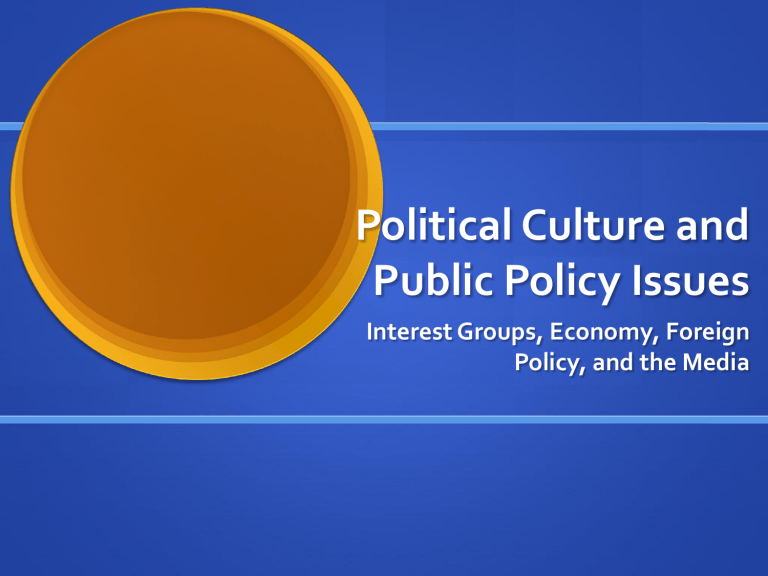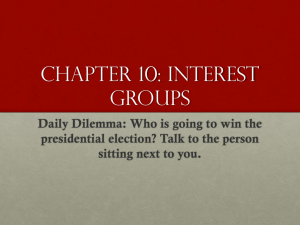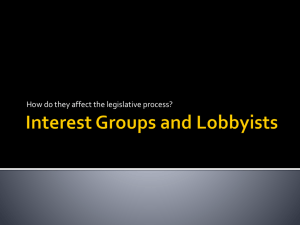PoliticalCulturePP - mrsliftigsocialstudies

Political Culture and
Public Policy Issues
Interest Groups, Economy, Foreign
Policy, and the Media
Journal #49
1. Do you agree or disagree with the following statements?
a. The decision makers who represent me at all levels of government are knowledgeable enough to make good decisions on their own.
b. Citizens should be allowed to petition their elected officials in any way they choose to make their positions known.
2. Lobbyist: Sounds positive or negative? What do you know already?
Special Interest Groups
Organizations established to carry out specific goals
Types:
Economic/business
Professional
Labor
Public Interest (PIRG)/Government watchdog
Ideological/Single issue (social, religious)
Influential interest groups
Business:
Chamber of Commerce
Labor:
AFL-CIO (union)
Professional:
American Medical Association
American Federation of Teachers
Single Issue: American Association of Retired People (AARP),
NOW, PETA
How they influence pubic policy
Researching issues and developing public policy proposals
(“think tanks”)
Giving political support to elected officials (electioneering)
Coordinating grassroots organizing at the local level
(public opinion)
Lobbying politicians to vote a certain way on bills
Lobbyists
People who persuade officials to vote on their interest group’s behalf
Meeting in the “lobbies” of the chambers
Rules for lobbyists
Registration
Must disclose expenses
Gift ban
Pros and Cons of Lobbies
Influence of money
Narrow interests
Provide specialized information
Keep Americans informed
Kept in balance by competing interests (democratic pluralism)
“The revolving door”
Former politicians who become lobbyists after leaving office
Why might this be a problem?
Journal #50
What were the results of your opinion poll from yesterday?
Were the results surprising? Why or why not?
Presentations
1. Brief overview of your interest group
Pick 1-3 interesting facts/points to share
2. Your lobbying strategies and main goal
How much $ spent
Why you chose the tools you did
3. Audience feedback
NOT on the interest group’s topic or cause!
On the lobbying strategies used/slogans/etc. and their effectiveness
Reflection Paragraph
Which tools did you use most often? Did you use more direct lobbying of legislators or more grassroots mobilization? Why? How did you decide which tools to use?
In your specific case, which tools do you think would be most effective in real life?
Discussion
Is lobbying a negative or positive part of the legislative process?
How effective are lobbyists?
What are the best ways for decision makers to acquire information?
Are the laws that currently govern lobbying effective?
“It’s the economy, stupid”
Personal budget
Government budget
Taxes
Stock Market
The Federal Budget
OMB (Office of Management and Budget) helps the president create a budget to submit to Congress each year
Balanced budget: Revenue = expenditures
Surplus: Revenue exceeds expenditures
Deficit: Expenditures exceeds revenue
Deficits + interest = debt
How does the government spend its money?
How does the government get its money?
Taxes:
Income
Sales
Property
Social security
Corporate
Excise tax/sin tax
Estate/gift tax (indirect tax)
Import tax (tariff)
Progressive
Income taxes
Regressive
Sales tax
Tax Brackets
How else does the government get its money?
1. Social Security Trust Fund: Holds total of $2.67 trillion debt which is 19% of the total debt.
2. The Federal Reserve: Holds total of $1.63 trillion, 11.3% of the total debt.
3. China: Holds $1.6 trillion, 8% of total debt.
4. US Households: Holds $959.4 billion of Treasury bonds, which is 6.6% of the total US debt.
5. Japan: Holds 6.4% of total US debt.
Debt holders
The Stock Market
You will be creating your own business
To start your business, you will need capital ($)
Instead of borrowing, you can sell parts of your company to investors, who make profit (dividends)
Shares (parts) of ownership in a company = stock
Goal for businesses: Have your share price go up
Goal for shareholders: Buy low, sell high!
Mock Stock Market Roles
Stockbrokers:
All start with $40
Goal is to make the most money at the end of the game (cash plus the end value/price of your stocks)
Companies:
All start with 50 shares of stock
Goal is to sell the most stock
You will need to have a good business plan, specific details on how the company is run, and good marketing skills
Mock Stock Market Rules
I am the market and I will be handling all of the money and deciding all stock prices!
We will have rounds of trading. During rounds you will:
Buy stocks (if you are a stockbroker)
Try to convince buyers to buy your stock (if you are a company)
At the end of each round, you will:
Sell or hold onto your stocks (stockbrokers)
Work on making your company better (companies)
I will change the prices per share of stock for each company based on how well they are performing
Higher = company doing well (more potential profit)
Lower = company not doing as well (more potential loss)
Modern Media
What should be the role/job of the media in a democracy?
Do you think that the media is doing their job? Why or why not?
What are positive aspects of the media today? Negative characteristics?
Trends in Media Coverage
TV: 24 hr. coverage (CNN), increasingly ideological
Talk radio: Mostly conservative
Internet
Intense competition
Dirty laundry
Sensationalism
Media conglomerates: Disney/ABC/ESPN;
TimeWarner/Turner Broadcasting, Viacom (CBS, MTV, VHI)
Media Bias
“Liberal” media?
Fox News vs. MSNBC
Examples?







